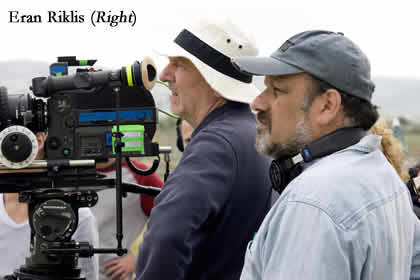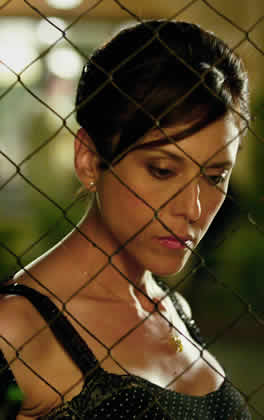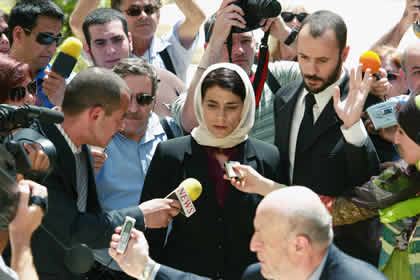Eran Riklis (director of Lemon Tree) is one of Israel’s leading film makers. His films include THE SYRIAN BRIDE (2004), winner of 18 international awards, released world wide, CUP FINAL (1992, presented in Venice and Berlin and in numerous other festivals), ZOHAR (1993, the biggest Israeli box-office success of the ‘90s), TEMPTATION (2002, based on an Israeli bestseller), the nostalgic rock & roll film VULCAN JUNCTION (2000) and his first film, ON A CLEAR DAY YOU CAN SEE DAMASCUS (1984).
ZOHAR (1993, the biggest Israeli box-office success of the ‘90s), TEMPTATION (2002, based on an Israeli bestseller), the nostalgic rock & roll film VULCAN JUNCTION (2000) and his first film, ON A CLEAR DAY YOU CAN SEE DAMASCUS (1984).
Riklis directed and produced many TV films, major series and documentaries, including ROOM SERVICE, THE TRUCK, CAUSE OF DEATH: MURDER, ME AND MY FAMILY, LUCKY, LETHAL MONEY, THE POETICS OF THE MASSES, BORDERS and more. He also produced films such as THREE MOTHERS, BURNING MUKI, UNTIL TOMORROW COMES and more. Born in Jerusalem, raised in the USA, Canada and Brazil, Riklis graduated from The National Film School, Beaconsfield, England in 1982.
Married to Dina (a filmmaker), father of Tammy (a committed journalist) and Jonathan (a jazz pianist), lives in Tel Aviv and works with the world.
Bijan Tehrani: Like your previous film, “Syrian Bride”, “Lemon Tree” is about the trouble at the borders between Israel and its neighbors. Please tell us what attracts you to this topic.
Eran Riklis: Well, for me it is a central duty in a way, because I feel that if you live in a country like Israel, and you are a filmmaker, you have to deal with issues that are central to life in the Middle East. I feel that it is almost unavoidable to deal with the heart of the conflict that everyone deals with. Being a filmmaker, there is such a deep array of subjects and stories, you feel as if it is like a  coalmine. There is the possibility to tell a deep and moving story, and of course there are the political issues. I always say that I am not trying to make a political film, but am trying to bring the human side to a difficult political situation.
coalmine. There is the possibility to tell a deep and moving story, and of course there are the political issues. I always say that I am not trying to make a political film, but am trying to bring the human side to a difficult political situation.
BT: Is this film based on any real life events?
ER: Absolutely. The film is based loosely on a real story of a woman who went to court against the Minister of Defense. I found this story so inspiring. The truth is that these kind of stories happen almost every day. Like in any part of the world there are always issues that have to do with personal property rights. The sort of story is really universal.
BT: What has been the reaction to the film in Israel? Has it been shown to a Palestinian crowd?
ER: In Israel the reaction has not been so good; the film did not do very well. When you compare the success of the film almost everywhere else in the word–because it was very successful all over Europe and even Brazil–it did badly in Israel. I think Palestinians probably saw it around the world, but in the territories it is very difficult to see it in the cinema, but I’m sure that pirated DVDs were sold over there quite a lot [laughs]. I think reaction in general around the world was very good. In Israel, as such the film was treated as political, and maybe because Israeli sensitivities are too political, they overlooked the story.
BT: You mentioned that internationally the film was very successful, and this is very understandable because it is a film that tries to bridge borders and tackle a universal subject. The actress, Hiam Abbass, was brilliant in this film. She worked with you in “Syrian Bride” as well, but how did you decide to pick her for this film?
ER: Right after my last film I decided to make another film with Hiam, because I had such a good experience with her and she is such a fantastic actress. We became really good friends, and when I came across the story for “Lemon Tree” we immediately decided that it would be for her. When we wrote the script, we wrote it with Hiam in mind, which made the writing very easy. With Hiam I work very deeply into the character; we talk and rehearse a lot. It is a very close and fruitful relationship. She is really fantastic, and I hope to make a film with her in the future that is not necessarily about a woman in the Middle East, but maybe something that goes beyond that, because I really think she can do many other roles. In general, with actors I am very careful with the way I cast my films because I really need authenticity and an emotional side to my characters. In my films I am very slow in my casting process because of this.
BT: With the other actors as well, they almost all seem to come from the same country that their characters come from. It helps with authenticity. Rona Lipaz-Michael, who plays Mira, is another great actress, and does a great job in this film.
job in this film.
ER: Yes, she is great.
BT: Do you have your actors strictly follow the script, or do you let them use their own dialogue and explore?
ER: The way that I work is that I don’t improvise a lot, but I do improvise while rehearsing. I really prefer to reach the set with a very clear idea with what I want and what the actors are doing. I really spend a lot of energy during rehearsals to find alternative dialogue and behavior, and to make sure that the actors and I understand what they are doing. When we reach the set it is really about performing what we preconceived, but of course as with any filmmaker you have an open mind because things do happen. But normally it is not so much about changing dialogue, but about omitting dialogue; many times you don’t need words, you just need a face and an atmosphere to tell the story. Once you are filming and have a real sense of what you are doing, the script becomes a very strong guideline, but it is flexible to changes.
BT: What about your future plans? Your films have very important things to say, and I think they do have an effect on people.
ER: Right now I am doing something that has nothing to do with the Middle East as such, even though it begins in Jerusalem. It is called “Human Resources”, and it is based on a book by a quite famous author named Abraham Joshua. It is about a Human Resources manager at a big bakery in Jerusalem, who has to take a body of a dead Russian worker back to Russia. It is an emotional and psychological journey. I am also working on a film called “Safe House”, about a Lebanese double or triple agent who is taken to a safe house by the Israeli Moussad. I am trying to move in different directions, but obviously my stories always begin somewhere close to home.

